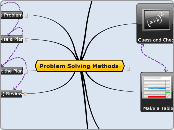Problem Solving Methods
The purpose of this map is to illustrate various methods of problem solving and provide material to better teach these methods.

Make a Drawing
Drawing a picture is often used when dealing with elements of space, distances, or organization.Put all the details of a problem into a picture so that you can better conceptualize what is going on and what you need to solve.
Teacher Vision
YouTube
This video adds to our problem solving methods by introducing a problem solving quadrant. The boxes to fill in using the problem solving quadrant are: Question, Facts, Plan, and Solve.All of the plans in this video demonstrate the make a drawing method.
YouTube

Guess and Check
Mathematicians use the guess and check method often. It requires you to make a conjecture on what the answer may be, solve using your conjecture, then check to see if what you thought will work.Often when using the guess and check method it is a good idea to make a table to record your answers.This is sometimes thought to be the weakest form of problem solving.
Teacher Vision
Pacificnet.net-MATH
This link includes various lesson plans for teachers. If you scroll 2/3 down the page you will find a section specifically for the guess and check method.
a
Make a Table
Tables are effective ways to organize information and locate patterns in a logical fashion.
Teacher Vision
Sudoku
This is a game putting logic to work in a 9x9 table.

Use a Model
Models, like drawing pictures, helps students visualize and understand problems better.
Elementary Test Prep
Fun activities to demonstrate the use of models in problem solving.
aYouTube
Video showing the use of a math balance (a physical model).

Work Backwards
Sometimes we know the end result but we need to know how that result was reached. This method (in math) allows us to find the starting numbers which caused our answer to be.
Math Central
This site offers different examples of problems you can use to illustrate the work backwards method.
aYouTube Video
Dooley TV
Dooley Elementary School has made several educational videos to help their students. This is directed at their students to provoke them into critical thinking. Specifically in this video is the topic of working backwards.View more at:http://k-12.pisd.edu/schools/dooley/dooleytv.htm
a1.) Understand the Problem
The first thing you must do when encountering a problem is to gain an understanding of that problem.What does the problem tell you? What is the question that you should be answering?
2.) Devise a Plan
Next you must come up with a plan of action to solve to problem.Decide, based on what you know, whether you should make a drawing, guess and check, make a table, use a model, or work backwards to solve.
3.) Carry Out the Plan
Third you must carry out your plan.Using the plan (or method) you chose, work with what you know until you solve the problem. If you are unable to reach a solution consider a different method of solving the problem.
4.) Review
Finally you must review the steps you took and decide whether or not your plan was successful and how effective it was. When doing this you may find that there is a better method you could use to reach the solution.
